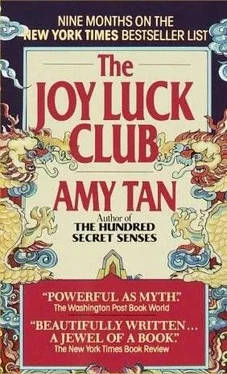And then my mother became somber again. She sat with her hands folded in her lap, watching as our boat drew closer and closer to the dock.
"An-mei, now you are ready to start your new life. You will live in a new house. You will have a new father. Many sisters. Another little brother. Dresses and good things to eat. Do you think all this will be enough to be happy?"
I nodded quietly, thinking about the unhappiness of my brother in Ningpo. My mother did not say anything more about the house, or my new family, or my happiness. And I did not ask any questions, because now a bell was sounding and a ship's steward was calling our arrival in Tientsin. My mother gave quick instructions to our porter, pointed to our two small trunks and handed him money, as if she had done this every day of her life. And then she carefully opened another box and pulled out what looked to be five or six dead foxes with open beady eyes, limp paws, and fluffy tails. She put this scary sight around her neck and shoulders, then grabbed my hand tight as we moved down the aisle with the crowd of people.
There was no one at the harbor to meet us. My mother walked slowly down the rampway, through the baggage platform, looking nervously from side to side.
"An-mei, come! Why are you so slow!" she said, her voice filled with fear. I was dragging my feet, trying to stay in those too-large shoes as the ground beneath me swayed. And when I was not watching which way my feet were moving, I looked up and saw everybody was in a hurry, everybody seemed unhappy: families with old mothers and fathers, all wearing dark, somber colors, pushing and pulling bags and crates of their life's possessions; pale foreign ladies dressed like my mother, walking with foreign men in hats; rich wives scolding maids and servants following behind carrying trunks and babies and baskets of food.
We stood near the street, where rickshaws and trucks came and went. We held hands, thinking our own thoughts, watching people arriving at the station, watching others hurrying away. It was late morning, and although it seemed warm outside, the sky was gray and clouding over.
After a long time of standing and seeing no one, my mother sighed and finally shouted for a rickshaw.
During this ride, my mother argued with the rickshaw puller, who wanted extra cash to carry the two of us and our luggage. Then she complained about the dust from the ride, the smell of the street, the bumpiness of the road, the lateness of the day, the ache in her stomach. And when she had finished with these laments, she turned her complaints to me: a spot on my new dress, a tangle in my hair, my twisted stockings. I tried to win back my mother, pointing to ask her about a small park, a bird flying above us, a long electric streetcar that passed us sounding its horn.
But she became only more cross and said: "An-mei, sit still. Do not look so eager. We are only going home."
And when we finally arrived home, we were both exhausted.
I knew from the beginning our new home would not be an ordinary house. My mother had told me we would live in the household of Wu Tsing, who was a very rich merchant. She said this man owned many carpet factories and lived in a mansion located in the British Concession of Tientsin, the best section of the city where Chinese people could live. We lived not too far from Paima Di, Racehorse Street, where only Westerners could live. And we were also close to little shops that sold only one kind of thing: only tea, or only fabric, or only soap.
The house, she said, was foreign-built; Wu Tsing liked foreign things because foreigners had made him rich. And I concluded that was why my mother had to wear foreign-style clothes, in the manner of newly rich Chinese people who liked to display their wealth on the outside.
And even though I knew all this before I arrived, I was still amazed at what I saw.
The front of the house had a Chinese stone gate, rounded at the top, with big black lacquer doors and a threshold you had to step over. Within the gates I saw the courtyard and I was surprised. There were no willows or sweet-smelling cassia trees, no garden pavilions, no benches sitting by a pond, no tubs of fish. Instead, there were long rows of bushes on both sides of a wide brick walkway and to each side of those bushes was a big lawn area with fountains. And as we walked down the walkway and got closer to the house, I saw this house had been built in the Western style. It was three stories high, of mortar and stone, with long metal balconies on each floor and chimneys at every corner.
When we arrived, a young servant woman ran out and greeted my mother with cries of joy. She had a high scratchy voice: "Oh Taitai, you've already arrived! How can this be?" This was Yan Chang, my mother's personal maid, and she knew how to fuss over my mother just the right amount. She had called my mother Taitai, the simple honorable title of Wife, as if my mother were the first wife, the only wife.
Yan Chang called loudly to other servants to take our luggage, called another servant to bring tea and draw a hot bath. And then she hastily explained that Second Wife had told everyone not to expect us for another week at least. "What a shame! No one to greet you! Second Wife, the others, gone to Peking to visit her relatives. Your daughter, so pretty, your same look. She's so shy, eh? First Wife, her daughters…gone on a pilgrimage to another Buddhist temple…Last week, a cousin's uncle, just a little crazy, came to visit, turned out not to be a cousin, not an uncle, who knows who he was…"
As soon as we walked into that big house, I became lost with too many things to see: a curved staircase that wound up and up, a ceiling with faces in every corner, then hallways twisting and turning into one room then another. To my right was a large room, larger than I had ever seen, and it was filled with stiff teakwood furniture: sofas and tables and chairs. And at the other end of this long, long room, I could see doors leading into more rooms, more furniture, then more doors. To my left was a darker room, another sitting room, this one filled with foreign furniture: dark green leather sofas, paintings with hunting dogs, armchairs, and mahogany desks. And as I glanced in these rooms I would see different people, and Yan Chang would explain: "This young lady, she is Second Wife's servant. That one, she is nobody, just the daughter of cook's helper. This man takes care of the garden."
And then we were walking up the staircase. We came to the top of the stairs and I found myself in another large sitting room. We walked to the left, down a hall, past one room, and then stepped into another. "This is your mother's room," Yan Chang told me proudly. "This is where you will sleep."
And the first thing I saw, the only thing I could see at first, was a magnificent bed. It was heavy and light at the same time: soft rose silk and heavy, dark shiny wood carved all around with dragons. Four posts held up a silk canopy and at each post dangled large silk ties holding back curtains. The bed sat on four squat lion's paws, as if the weight of it had crushed the lion underneath. Yan Chang showed me how to use a small step stool to climb onto the bed. And when I tumbled onto the silk coverings, I laughed to discover a soft mattress that was ten times the thickness of my bed in Ningpo.
Sitting in this bed, I admired everything as if I were a princess. This room had a glass door that led to a balcony. In front of the window door was a round table of the same wood as the bed. It too sat on carved lion's legs and was surrounded by four chairs. A servant had already put tea and sweet cakes on the table and was now lighting the houlu , a small stove for burning coal.
It was not that my uncle's house in Ningpo had been poor. He was actually quite well-to-do. But this house in Tientsin was amazing. And I thought to myself, My uncle was wrong. There was no shame in my mother's marrying Wu Tsing.
Читать дальше












